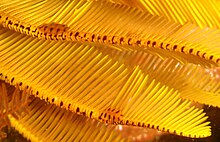
Crinoids are marine animals that make up the class Crinoidea. Crinoids that are attached to the sea bottom by a stalk in their juvenile form are commonly called sea lilies, while the unstalked forms, called feather stars or comatulids, are members of the largest crinoid order, Comatulida. Crinoids are echinoderms in the phylum Echinodermata, which also includes the starfish, brittle stars, sea urchins and sea cucumbers. They live in both shallow water and in depths as great as 9,000 meters (30,000 ft).
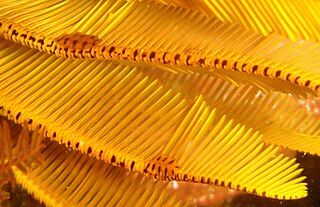
The Myzostomida or Myzostomatida are an order of small marine worms, which are parasitic on echinoderms, mostly crinoids. These highly unusual and diverse annelids were first discovered by Friedrich Sigismund Leuckart in 1827.

The frilled nudibranch, Leminda millecra, is a species of metarminid nudibranch, and is only found in South Africa. It is a marine gastropod mollusc in the family Charcotiidae.
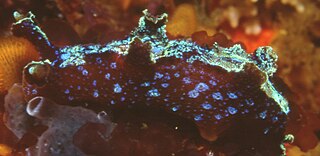
Notobryon wardi, the iridescent nudibranch, is a species of scyllid nudibranch, and is found in South Africa. It is a marine gastropod mollusc in the family Scyllaeidae.
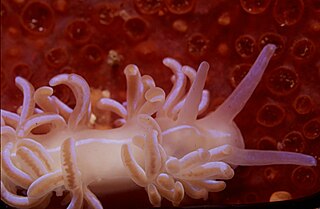
Phyllodesmium horridum, the coral nudibranch, is a species of sea slug, specifically an aeolid nudibranch. It is a marine gastropod mollusc in the family Facelinidae.

The hairy chiton is a species of chiton in the family Chaetopleuridae. It is a marine mollusc.
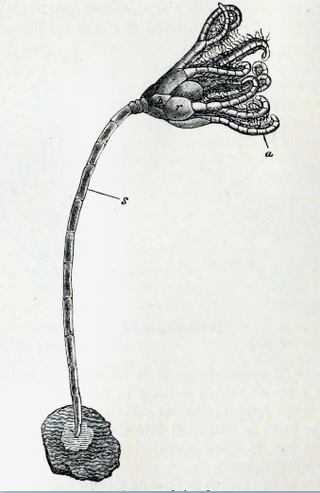
Antedon bifida is a species of crinoid in the family Antedonidae commonly known as the rosy feather star. It is found in north west Europe.
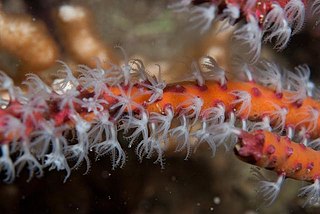
The gorgonian twig coral is a species of gorgonian sea fan in the family Anthothelidae.

Myzostoma is a genus of marine worms in the family Myzostomatidae. They are parasitic on crinoids.

The elegant feather star is a species of crinoid in the family Tropiometridae.

The crinoid shrimp, or feather star shrimpHippolyte catagrapha, is a species of shrimp in the family Hippolytidae
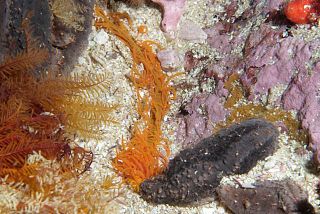
Cirriformia capensis, commonly known as the orange thread-gilled worm, is a species of marine polychaete worm in the family Cirratulidae.

Anilocra capensis is a species of parasitic isopod in the family Cymothoidae. It is endemic to southern Africa. The species preferentially attaches itself to the hottentot seabream.

Pachymetopon blochii, the hottentot seabream or hottentot, is a species of sea bream in the family Sparidae, native to the southwestern coast of Africa.
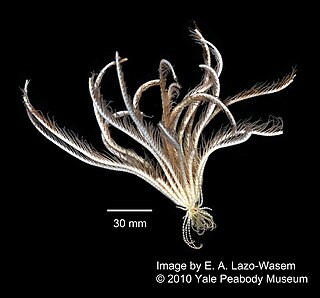
Promachocrinus kerguelensis is a species of free-swimming, stemless crinoids. It was the only member of its genus until several species were discovered in 2023. P. keruguelensis a coldwater crinoid which is found in the seas around Antarctica and surrounding island groups, including under the sea ice.
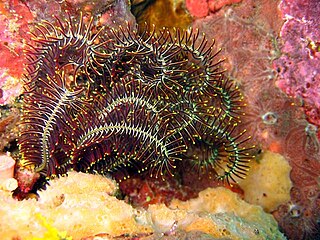
Comanthus is a genus of crinoid echinoderms belonging to the family Comatulidae.

Myzostoma divisor is a species of parasitic marine polychaete in the order Myzostomida.

Myzostoma josefinae is a species of parasitic marine polychaete in the order Myzostomida.
